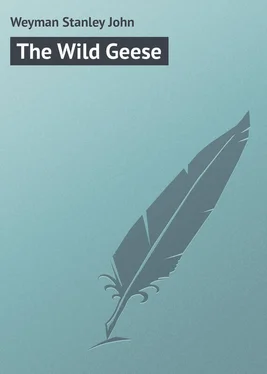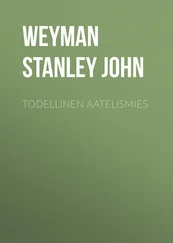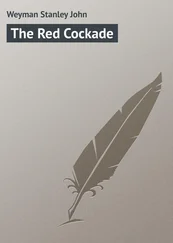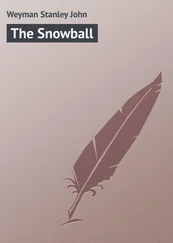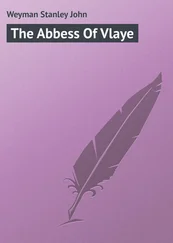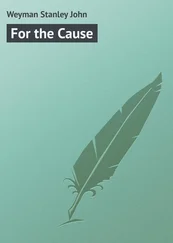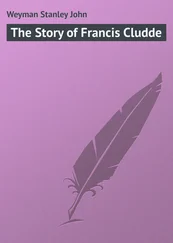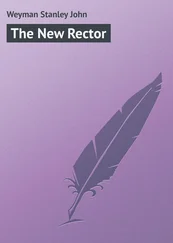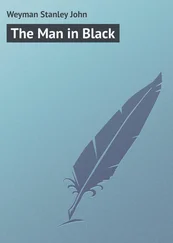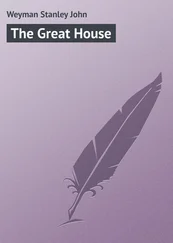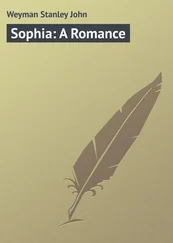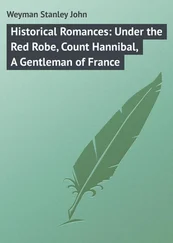Stanley Weyman - The Wild Geese
Здесь есть возможность читать онлайн «Stanley Weyman - The Wild Geese» — ознакомительный отрывок электронной книги совершенно бесплатно, а после прочтения отрывка купить полную версию. В некоторых случаях можно слушать аудио, скачать через торрент в формате fb2 и присутствует краткое содержание. Жанр: foreign_prose, на английском языке. Описание произведения, (предисловие) а так же отзывы посетителей доступны на портале библиотеки ЛибКат.
- Название:The Wild Geese
- Автор:
- Жанр:
- Год:неизвестен
- ISBN:нет данных
- Рейтинг книги:4 / 5. Голосов: 1
-
Избранное:Добавить в избранное
- Отзывы:
-
Ваша оценка:
- 80
- 1
- 2
- 3
- 4
- 5
The Wild Geese: краткое содержание, описание и аннотация
Предлагаем к чтению аннотацию, описание, краткое содержание или предисловие (зависит от того, что написал сам автор книги «The Wild Geese»). Если вы не нашли необходимую информацию о книге — напишите в комментариях, мы постараемся отыскать её.
The Wild Geese — читать онлайн ознакомительный отрывок
Ниже представлен текст книги, разбитый по страницам. Система сохранения места последней прочитанной страницы, позволяет с удобством читать онлайн бесплатно книгу «The Wild Geese», без необходимости каждый раз заново искать на чём Вы остановились. Поставьте закладку, и сможете в любой момент перейти на страницу, на которой закончили чтение.
Интервал:
Закладка:
The story was received with a volley of oaths and curses. "But by the Holy," Uncle Ulick flamed up, "I'd have hung on their heels and raised the country! By G – d, I would!"
"Ay, ay! The thieves of the world!"
"They took the big road by Tralee," James McMurrough explained sulkily. "What was the use?"
"Were there no men working in the bogs?"
"There were none near by, to be sure," Morty said. "But I'd a notion if we followed them we might light on one friend or another – 'twas in Kerry, after all!"
"'Twas not more than nine miles English from here!" Uncle Ulick cried.
"That was just what I thought," Morty continued with some hesitation. "Just that, but – " And his eye transferred the burden to The McMurrough.
James answered with an oath. "A nice time this to be bringing the soldiers upon us," he cried, "when, bedad, if the time ever was, we want no trouble with the Englishry! What's the use of crying over spilt milk? I'll give you another mare."
"But it'll not be Giralda!" Flavia wailed.
"Sure it's the black shame, it is!" Uncle Ulick cried, his face dark. "It's enough to raise the country! Ay, I say it, though you're listening, Asgill. It's more than blood can stand!"
"No one is more sorry than myself," Asgill replied, with a look of concern. "I don't make the laws, or they'd be other than they are!"
"True for you," Uncle Ulick answered. "I'm allowing that. And it is true, too, that to make a stir too early would ruin all. I'm afraid you must be making the best of it, Flavvy! I'd go after them myself, but the time's not convenient, as you know, and by this they're in Tralee, bad cess to it, where there's naught to be done. They'll be for selling her to one of the garrison officers, I'm thinking; and may the little gentleman in black velvet break his neck for him! Or they'll take her farther up country, maybe to Dublin."
Flavia's last hopes died with this verdict. She could not control her tears, and she turned and went away in grief to the house.
Meantime the hangers-on and the beggars pressed upon the gentry, anxious to hear. The McMurrough, not sorry to find some one on whom to vent his temper, turned upon them and drove them away with blows of his whip. The movement brought him face to face with Captain Augustin. The fiery little Frenchman disdained to give way, in a trice angry words passed, and – partly out of mischief, for the moment was certainly not propitious – Asgill repeated the proposal which Colonel John had just made. The Colonel had stood in the background during the debate about the mare, but thus challenged he stood forward.
"It's a fair compromise," he argued. "And if Captain Augustin is prepared to pay twenty per cent – ."
"He'll not have his cargo, nor yet a cask!" The McMurrough replied with a curt, angry laugh. "Loss and enough we've had to-day."
"But – "
"Get me back the mare," the young man cried, cutting the Colonel short with savage ridicule. "Get me back the mare, and I'll talk. That's all I have to say."
"It seems to me," Colonel John replied quietly, "that those who lose should find. Still – still," checking the young man's anger by the very calmness of his tone, "for Captain Augustin's sake, who can ill bear the loss, and for your sister's sake, I will see what I can do."
The McMurrough stared. "You?" he cried. "You?"
"Yes, I."
"Heaven help us, and the pigs!" the young man exclaimed. And he laughed aloud in his scorn.
But Colonel John seemed no way moved. "Yes," he replied. "Only let us understand one another" – with a look at Uncle Ulick which made him party to the bargain – "if I return to-morrow evening or on the following day – or week – with your sister's mare – "
"Mounseer shall have his stuff again to the last pennyworth," young McMurrough returned with an ironical laugh, "and without payment at all! Or stay! Perhaps you'll buy the mare?"
"No, I shall not buy her," Colonel John answered, "except at the price the man gave you."
"Then you'll not get her. That's certain! But it's your concern."
The Colonel nodded, and, turning on his heels, went away towards the house, calling William Bale to him as he passed.
The McMurrough looked at the Frenchman. He had a taste for tormenting some one. "Well, monsieur," he jeered, "how do you like your bargain?"
"I do not understand," the Frenchman answered. "But he is a man of his word, ma foi ! And they are not – of the common."
CHAPTER V
THE MESS-ROOM AT TRALEE
If England had made of Ireland a desert and called it peace, she had not marred its beauty. That was the thought in Colonel Sullivan's mind as he rode eastward under Slieve Mish, with the sun rising above the lower spurs of the mountain, and the lark saluting the new-born radiance with a song attuned to the freshness of the morning. Where his road ascended he viewed the sparkling inlet spread far to the southward; and where the track dipped, the smooth slopes on either side ran up to grey crags that, high above, took strange shapes, now of monstrous heads, now of fantastic towers. As his sure-footed nag forded the brown bog-stream, long-shanked birds rose silently from the pools, and he marked with emotion the spots his boyhood had known: the shallow where the dog-wolf – so big that it had become a fable – died biting, and the cliff whence the sea-eagle's nest had long bidden him defiance.
Bale rode behind him, taciturn, comparing, perhaps, the folds of his native Suffolk hills with these greener vales. They reached the hedge tavern, where the mare had been seized, and they stayed to bait their horses, but got no news. About eight they rode on; and five long Irish miles nearer Tralee, though still in a wild and lonely country, they viewed from the crest of a hill a piece of road stretched ribbon-like before them, and on it a man walking from them at a great pace. He had for companion a boy, who trotted beside him.
Neither man nor boy looked back, and it did not seem to be from fear of the two riders that they moved so quickly. The man wore a loose drugget coat and an old jockey-cap, and walked with a stout six-foot staff. Thus armed and dressed he should have stood in small fear of robbers. Yet when Colonel John's horse, the tread of its hoofs deadened by the sod road, showed its head at his shoulder, and he sprang aside, he turned a face of more vivid alarm than seemed necessary. And he crossed himself.
Colonel John touched his hat. "I give you good morning, good man," he said.
The walker raised his hand to his cap as if to return the salute, but lowered it without doing so. He muttered something.
"You will be in haste?" Colonel John continued. He saw that the sweat stood in beads on the man's brow, and the lad's face was tear-stained.
"I've far to go," the man muttered. He spoke with a slight foreign accent, but in the west of Ireland this was common. "The top of the morning to you."
Plainly he wished the two riders to pass on, but he did not slacken his speed for a moment. So for a space they went abreast, the man, with every twenty paces, glancing up suspiciously. And now and again, the boy, as he ran or walked, vented a sob.
The Colonel looked about him. The solitude of the valley was unbroken. No cabin smoked, no man worked within sight, so that the haste of these two, their sweating faces, their straining steps, seemed portentous. "Shall I take up the lad?" Colonel John asked.
Plainly the man hesitated. Then, "You will be doing a kindness," he panted. And, seizing the lad in two powerful arms, he swung him to the Colonel's stirrup, who, in taking him, knocked off the other's jockey-cap.
The man snatched it up and put it on with a single movement. But Colonel John had seen what he expected.
"You walk on a matter of life and death?" he said.
Читать дальшеИнтервал:
Закладка:
Похожие книги на «The Wild Geese»
Представляем Вашему вниманию похожие книги на «The Wild Geese» списком для выбора. Мы отобрали схожую по названию и смыслу литературу в надежде предоставить читателям больше вариантов отыскать новые, интересные, ещё непрочитанные произведения.
Обсуждение, отзывы о книге «The Wild Geese» и просто собственные мнения читателей. Оставьте ваши комментарии, напишите, что Вы думаете о произведении, его смысле или главных героях. Укажите что конкретно понравилось, а что нет, и почему Вы так считаете.
